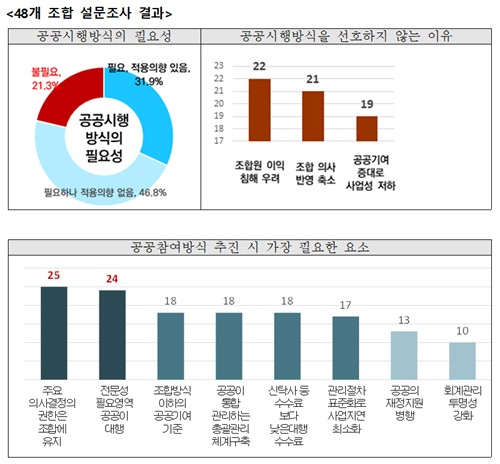
(Seoul=Yonhap Infomax) Jong Il Joo = The South Korean government has introduced a public-led approach to urban redevelopment projects to enhance transparency and accelerate progress, but on-the-ground sentiment remains lukewarm.
According to a recent survey of redevelopment sites in Seoul, only about 30% responded that they would adopt the public implementation model.
While many project associations acknowledged that public participation could strengthen their expertise and bargaining power, concerns persist over potential infringement on members’ interests and reduced decision-making authority.
The Housing Industry Research Institute (JUSAN Research Institute) held a seminar on November 19 at the National Assembly Members’ Office Building in Yeouido, co-hosted with Democratic Party lawmakers Eonju Lee and Taejun An, and the LH Seoul Regional Headquarters, under the theme “Measures to Promote Public Participation for Urban Redevelopment Revitalization and Expedited Progress.”
JUSAN Research Institute revealed that, based on a survey conducted this month of 48 redevelopment project committees and association executives in Seoul, 78.7% said public participation is necessary. However, only 31.9% said they would actually apply the public implementation model already in place.
The public implementation model refers to direct participation by public enterprises such as Korea Land & Housing Corp. (LH) as project operators in urban redevelopment. While expectations were high for improved transparency and faster project timelines, the model has yet to gain significant traction at the field level.
Among respondents who did not favor the public model, 45.8% cited concerns over infringement of association members’ interests. Another 43.7% pointed to reduced decision-making rights for members, while 39.6% highlighted diminished project profitability due to increased public contributions.
Additional survey findings included:
- 52.1% said associations should retain key decision-making authority in public participation models
- 50.0% wanted public entities to handle areas requiring specialized expertise
- 37.5% requested that public contribution standards be set at or below those of the association-led model
JUSAN Research Institute emphasized that, to stabilize housing markets in major metropolitan areas such as Seoul, expanding rapid housing supply is more effective than temporary demand-suppression measures.
The institute called for institutionalizing its proposed “Special Housing Supply Measures Area” to accelerate land and new town supply in the Seoul metropolitan area, and for improvements to the public participation model.
JUSAN Research Institute proposed introducing a “Public Agency Delegated Redevelopment Project System.”
Specifically, the proposal calls for public agencies to handle contractor selection, determine construction quality and costs, and seek association input and resident consent before contracts. In cases where construction costs must inevitably increase, the public agency would negotiate, but final approval would require resident consent.
For the selection of over 100 service providers, such as appraisal and environmental impact assessment firms, the institute suggested that associations select those not requiring specialized expertise, as is currently the case, while public agencies should select providers for areas requiring expertise, such as traffic and disaster impact assessments.
Additionally, the institute proposed that public agencies lend operating funds to associations, and that public funds such as the Housing and Urban Fund, along with public agencies, directly support or guarantee a portion of project financing. In the event of unsold units in general sales, the public agency would guarantee purchase, and a 50% reduction in the reconstruction excess profit recovery would be applied.
diju@yna.co.kr
(End)
Copyright © Yonhap Infomax Unauthorized reproduction and redistribution prohibited.

